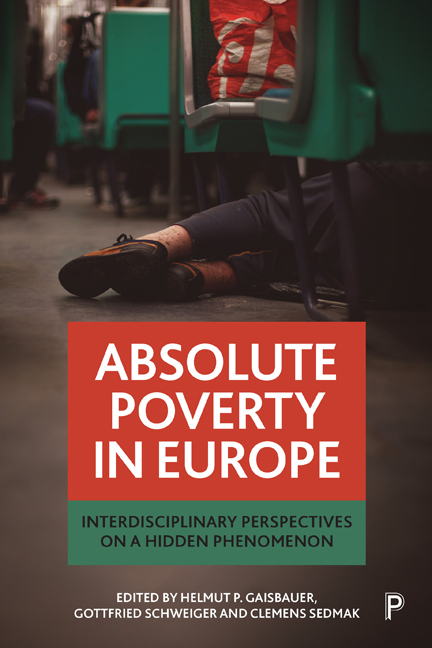Book contents
- Frontmatter
- Contents
- List of figures and tables
- Notes on contributors
- 1 Absolute poverty in Europe: introduction
- Part One Conceptual and methodological challenges
- Part Two Key issues for the absolute poor
- Part Three Policy responses to absolute poverty in Europe
- Part Four Ethical perspectives on absolute poverty in Europe
- Conclusion responding to the dark reality of absolute poverty in European welfare states
- Index
8 - Food poverty and the families the state has turned its back on: the case of the UK
Published online by Cambridge University Press: 27 April 2022
- Frontmatter
- Contents
- List of figures and tables
- Notes on contributors
- 1 Absolute poverty in Europe: introduction
- Part One Conceptual and methodological challenges
- Part Two Key issues for the absolute poor
- Part Three Policy responses to absolute poverty in Europe
- Part Four Ethical perspectives on absolute poverty in Europe
- Conclusion responding to the dark reality of absolute poverty in European welfare states
- Index
Summary
Introduction
When people make significant compromises about food this is a central aspect of relative and absolute poverty, however those conditions are defined. Food is a basic human need. At one level, food provides the nutrients needed for growth and development. Inequitable access to healthy food plays a role in health inequalities. But the ways the basic need for food is met are relative to geographical and societal conditions. Food is also fundamentally meaningful, a source of pleasure, a way of expressing care, a medium of control (O’Connell and Brannen, 2014) and a means of social inclusion and exclusion. Food is intimately linked to identity: we are what we eat (Fischler, 1988). Indeed families are reproduced by activities such as eating together (DeVault, 1991; Morgan, 2011). Furthermore, exercising choice in the marketplace, including what food to buy and eat, is one means of enacting agency in a consumer society.
Food poverty in the Global North is an urgent moral and social concern (Dowler and O’Connor, 2012; Riches and Silvasti, 2014). The global economic recession, rising food prices and so-called ‘austerity’ policies in some European countries have made food less affordable for households in recent years. In this context, food poverty and insecurity have risen across Europe, albeit there are differences between countries (Davis and Baumberg Geiger, 2015; Pfeiffer et al, 2015; Loopstra et al, 2016). This chapter examines the case of the UK, where food banks have proliferated (Loopstra et al, 2015) and the number of food parcels handed out to families has risen dramatically (Lambie-Mumford and Green, 2015).
Whilst there is evidence that the global financial crisis and changing social policy, including welfare reform, have hit UK families (households with children) harder than those without (De Agostini et al, 2014; Stewart, 2015), there is a lack of systematic evidence about household food insecurity or poverty in Europe, including the UK, and about how economic changes impact on families’ ability to feed themselves. Furthermore, the poorest households are underrepresented in large-scale datasets so that in the US monetary incentives are increasingly offered to address this (Singer, 2002). Those who are on the edges of society such as asylum seekers and those without leave to remain are likely to be totally excluded. Indeed, this exclusion from social research and official statistics may itself be regarded as a form of impoverishment.
- Type
- Chapter
- Information
- Absolute Poverty in EuropeInterdisciplinary Perspectives on a Hidden Phenomenon, pp. 159 - 182Publisher: Bristol University PressPrint publication year: 2019



